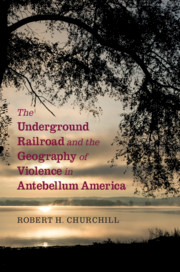‘Churchill's portrayal of the ways in which the distinctively Southern culture of violence alienated Northern communities subject to invasion by slave catchers is exceptionally acute. Churchill has made a lasting contribution to the history of the complex phenomenon that was the Underground Railroad, the nation's first civil rights movement.'
Fergus Bordewich - author of Bound for Canaan: The Underground Railroad and the War for the Soul of America
‘Original, thoroughly and comprehensively researched, well written, and tightly argued.'
Steven Lubet - author of The 'Colored Hero' of Harpers Ferry
‘A significant contribution to the literature on the Underground Railroad.'
Graham Hodges - George Dorland Langdon, Jr Professor of History and Africana and Latin American Studies, Colgate University, New York
‘Using court records, print media, and memoirs, Churchill depicts the pervasive nature of the violence that defined the relationship between fugitive slaves, bounty hunters, abolitionists, and the great many Northerners who wished no association with the culture of slavery.’
S. L. Smith
Source: Choice
‘Considered together with the hundreds of individual stories of African American migrants and their interracial associates, this rich travel narrative framed by violence, intrigue, and self-determination enriches our understanding of the antebellum period.'
Timothy Fritz
Source: The Portolan
‘… excellent analysis … the book demonstrates that the movement operated within a diverse 'geography of violence,' which shaped the responses of northern whites. The Underground Railroaddraws insightful connections between geographically disparate regions through the lens of cultural violence.’
Oran Patrick Kennedy
Source: American Nineteenth Century History



